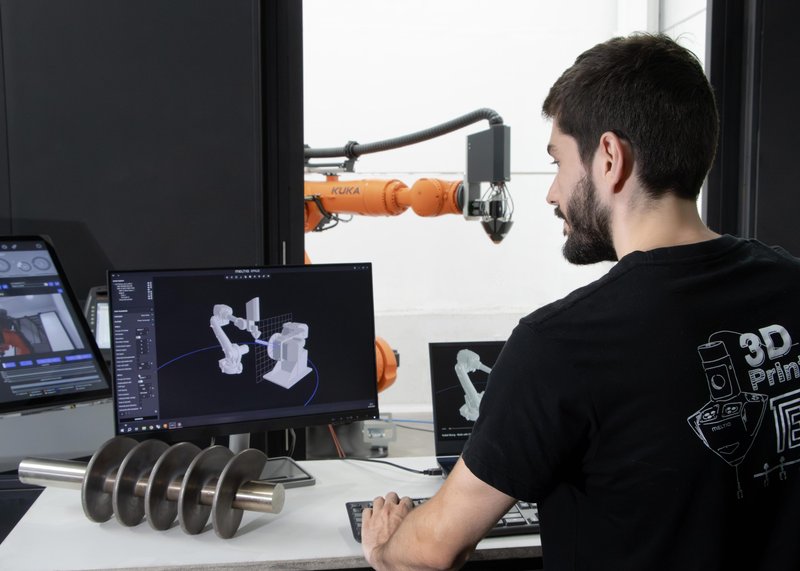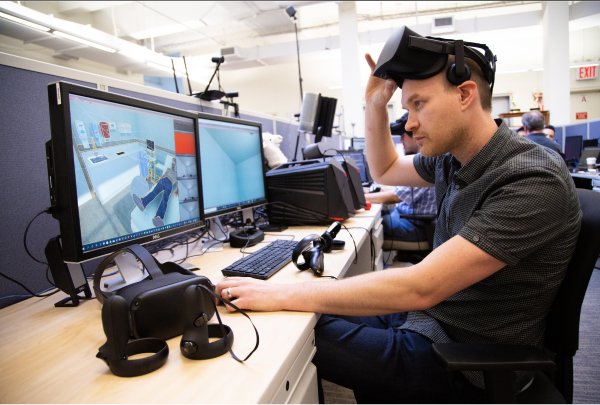It’s a time when changes are everywhere, with both businesses and employees transforming rapidly. Technologies are advancing further, changing most other spheres of our lives. In such a time, many new roles and professions emerge to solve new problems and support new needs people have.
New roles require new skills and approaches to succeed. Technologies such as artificial intelligence, virtual and augmented reality, machine learning, and more are now shaping the job market.
In this article, we will discuss some of the future in-demand professions. We’ll examine the skills they require and the responsibilities they entail, helping you understand what working in these fields would look like. Let’s delve deeper into the jobs that will become very popular in the near future and might become your dream job.
Artificial Intelligence (AI) Developer

Developers and engineers are already considered highly qualified and important parts of the business mechanism these days. However, artificial intelligence developers are on a whole new level. AIs are already ubiquitous, so the need for people who can operate them is growing each year.
The demand for AI developers will create thousands of new jobs. It is projected that the value of AI will exceed $190 billion by 2025. This escalating demand is primarily fueled by AI's pivotal role in fostering innovation, improving efficiency, and creating competitive advantages for businesses worldwide.
Moreover, COVID-19 has accelerated technological growth and demonstrated how technology can contribute to our everyday lives. As a result, the development of AI is a top priority for many businesses, as well as for individuals who can code and operate these technologies.
- As people use artificial intelligence more often, AI developers are in high demand
- The value of the AI market is expected to reach $190 billion by 2025
- The development of AI is a top priority for most businesses
Cybersecurity Specialist

Everyone has a digital persona online, and there are specialists responsible for keeping this persona safe. They are called cybersecurity specialists. In the digital era of the internet and telecommunications, an increasing number of cyber threats occur, leading to a demand for skilled professionals in the field.
As businesses increasingly rely on technology, the protection of their data from cyberattacks becomes critical. This need is further amplified by the rapid digital transformation across industries, exposing organizations to new vulnerabilities and risks. It is expected that the market will continue to grow, reaching a value of about $300 billion by 2027.
- Cybersecurity professionals are responsible for protecting people's online data
- The demand for cybersecurity professionals is high due to the threats and risks associated with digital information
- The market value is projected to reach $300 billion by 2027
Big Data Analyst

Most of the data people archive is now in the digital space, making individuals capable of working with this data extremely valuable. Big data analysts know how to extract, process, and analyze huge datasets to help businesses make crucial decisions based on their findings.
Experts predict stable and continuous growth for the field of big data. The global big data market is expected to reach up to $275 billion by the end of 2024. This growth is driven by the increasing need for analysts in various industries to manage and analyze big data.
This is great news for specialists in the field and for those who want to pursue this career. As businesses and industries recognize the importance and convenience of storing data in digital formats, the demand for skilled professionals will remain high in the foreseeable future.
- More and more businesses and industries need big data analysts
- The global big data market is projected to reach about $275 billion by the end of 2024
- Professionals capable of analyzing big data will be in demand for a long time
Telemedicine Doctor

Telemedicine specialists are transforming the healthcare industry by using technology to provide online consultations and care. Similar to hotlines, doctors can offer medical advice remotely using telecommunication tools such as video calls, phone calls, and texting. It is projected that the global telemedicine market will reach $130 billion by 2025, creating new job opportunities for doctors.
Several factors contribute to the growth of this profession. The first one is, obviously, the COVID-19 pandemic, which underscored the necessity for remote healthcare services. Telemedicine has the potential to become an irreplaceable tool in situations with serious health threats, as COVID once was.
The next factor is the accessibility of these services, particularly for people living in rural and underserved areas where access to healthcare is limited. Telemedicine allows patients to save time on traveling to the hospital and prevents them from potentially infecting others.
- The global telemedicine market is projected to reach $130 billion by 2025
- COVID-19 has accelerated the need for remote healthcare opportunities
- Telemedicine is expected to save both time and money of a patient
Environmentalist

Environmentalists are the heroes of tomorrow. They are the people who do everything they can to ensure a better future for humans and nature. With the consequences of climate change becoming increasingly evident each year, the role of environmentalists is becoming more significant.
Specialists in this field not only care for nature; they also require a wide range of different skills and knowledge. They must implement new technologies to help mitigate the effects of climate change, raise awareness among the general public, and communicate the needs of nature to others. Additionally, they must advocate for these needs when facing governmental opposition.
Environmentalists are the driving force of the change we need. To become one, a person must have a strong personality and the ability to stand their ground in a way that satisfies everyone.
- Environmentalist is one of the few future professions that focus on caring for the planet
- Working as an environmentalist involves acquiring a wide range of skills, including communication and technology knowledge
Internet Marketing

Online marketers (also known as internet marketers or digital marketers) are professionals in a rapidly developing field that intersects programming and society. They should know tactics and options for promoting products and services, develop advertising plans, and improve customer engagement and sales.
The main difference between general and online marketing is that the internet allows you to reach an audience from all over the world. Through social media, email messaging, and search engines, online advertising can connect with the target audience in the right place at the right time.
Internet marketing can also be well-measured, allowing for monitoring of campaign performance from start to finish. This enables marketers to make quick decisions and change their strategies as needed. As companies rely on digital marketing more than ever, the expected growth rate of the market value is estimated to be about 8% by 2028.
Overall, online marketing can be a successful and dynamic career choice with many opportunities, as skilled specialists play a vital role in business development.
- Online marketers promote products and services using social media and online platforms
- The internet allows marketers to reach their target audience worldwide
- The online marketing sphere requires skills in technology, social psychology, marketing, and more
3D Printing Engineer

3D printing engineering marks a new era for manufacturing, design, and various other industries. Engineers are using advanced technologies to transform digital models into three-dimensional objects. The 3D printing industry is projected to experience stable growth, with a market value expected to reach $52 billion by 2025.
3D printing engineers are responsible for creating and optimizing 3D models for printing. They use special software to design digital models and then use 3D printers to produce physical objects. They must have a solid understanding of design principles, materials science, and the capabilities of various types of 3D printing technology.
In addition to designing 3D models, engineers are responsible for troubleshooting and maintaining the 3D printer. They need to be familiar with various types of printers and able to identify and solve problems that arise during the 3D printing process. 3D printing engineers also conduct research and development, exploring new applications and pushing the boundaries of the technology. They collaborate closely with other engineers, designers, and manufacturers to create innovative products and solutions.
- The 3D printing industry is projected to experience stable growth and reach a value of $52 billion by 2025
- 3D printing engineers are designers, technicians, and programmers all at once
Virtual and Augmented Reality Developer

VR/AR developers are at the forefront of creating immersive experiences that bridge the digital and physical worlds. They leverage their programming, design, and innovation skills to develop apps and experiences that revolutionize how we interact with technology.
The main job of VR/AR developers is to create interactive experiences that enable users to navigate virtual environments or interact with digital content overlaid on the physical world. This demands a deep understanding of 3D modeling, animation, UI design, and programming languages.
Virtual and augmented reality are not limited to gaming and entertainment. Developers in this field also work in industries such as education, healthcare, architecture, design, and more. VR and AR engineers can turn dreams into reality, allowing people to engage with imaginative environments. The demand is so high that the market value is estimated to reach $95 billion by 2025.
- VR and AR extend beyond entertainment, such as gaming, yet it is gaming that has largely contributed to the popularity of the industry
- VR/AR engineers are proficient in programming, design, 3D modeling, and more
- The market value is forecasted to reach $95 billion by 2025
Natural Language Processing Expert

NLP experts are direct colleagues of AI developers, and their work complements each other, creating AI-assisted tools we all use. Instead of creating the AI system itself, NLP specialists teach it to understand and interpret human language correctly. As people increasingly rely on AI tools to simplify their lives, NLP experts are an essential part of the implementation process. The demand for professionals in the field is growing, with the market value estimated to increase by 17% by the end of 2024.
The demand for NLP experts extends across various industries beyond technology. These sectors encompass healthcare, finance, education, customer service, and more. Their work is instrumental in analyzing and processing substantial volumes of natural language data, such as text or speech, to deliver accurate responses to users.
Some people may not realize it, but they already heavily rely on these technologies, using chatbots and virtual assistants like Siri, Cortana, and others. These AI tools are the result of the hard work of both AI developers and NLP specialists.
- NLP experts ensure that AI accurately understands human speech and text
- The market value is expected to increase by 17% by the end of 2024
- NLP experts are in-demand in spheres such as healthcare, finance, customer service, and more
Climate Change Adaptation Specialist

Specialists in climate change adaptation play a vital role in assisting communities, governments, and organizations in preparing for and addressing the effects of climate change. Their work involves developing strategies and policies to mitigate these impacts, protect vulnerable populations, and enhance resilience in the face of environmental changes.
A key responsibility of climate change adaptation specialists is to evaluate the risks and vulnerabilities associated with climate change in specific regions or sectors. This process includes conducting research, gathering data, and collaborating with stakeholders to understand the potential consequences of climate change and identify areas most susceptible to its effects.
Based on their evaluations, adaptation specialists formulate and implement adaptation plans and strategies. These plans may involve initiatives such as enhancing infrastructure resilience, establishing early warning systems, implementing water management tactics, and advocating for sustainable land use practices.
Furthermore, climate change adaptation specialists contribute to raising awareness about climate change and its repercussions. They work to educate communities and policymakers about the importance of adaptation and the measures that can be taken to minimize vulnerability and enhance resilience.
- Professionals in the industry evaluate risks, raise awareness among the general public, and develop strategies to address the problems associated with climate change
- Climate change adaptation specialists, along with environmentalists, are those who care about the future of the planet and humanity
In conclusion, technological advancements, global economic changes, and environmental issues are driving the need for new solutions. This is how the jobs of the future are being created. We are already able to predict which ones will be in high demand.
These professions offer a glimpse into the future of work, with many other emerging roles shaping the job market. It is crucial for individuals to stay informed about these trends and consider how they can prepare for future job opportunities. By remaining attentive to these developments and exploring suitable professions, individuals can position themselves for success in the evolving work environment.
